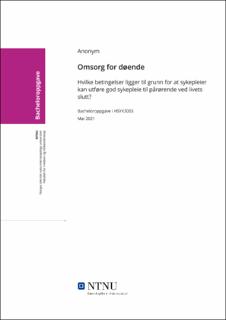Hvilke betingelser ligger til grunn for at sykepleier kan utføre god sykepleie til pårørende ved livets slutt?
Bachelor thesis
Permanent lenke
https://hdl.handle.net/11250/2782858Utgivelsesdato
2021Metadata
Vis full innførselSamlinger
Sammendrag
Abstrakt:Innledning: Artikkelen tar for seg flere sykepleieres erfaring og opplevelser i deres møte med døende mennesker. Artikkelen belyser hva de mente måtte vektlegges, og hva som kan være utfordrende i hverdagen i møte med pårørende. Metode: Et samarbeidsprosjekt mellom NTNU sykepleieutdanningen representert av fire studenter og et hospice. For å undersøke hva en sykepleier tenker angående pårørende ved livets slutt i praksis ble det gjennomført fire kvalitative empiriske intervju med sykepleiere med erfaring fra et Hospice. Intervjuene ble gjennomført i uke 12 i 2020, og analysert ved hjelp av prinsippene for systematisk tekstkondensering. Resultater: Våre funn viser til at sykepleierne ved Hospicet har en trygghet, en faglig kompetanse som synes å være veldig viktig i deres møte med pasient og pårørende i alle aldre. Ikke alle kan jobbe ved en slik plass, da det virket som igjennom intervjuene at disse var håndplukkede til jobben. Kompetanse er en ting, med personlig egnethet er om mulig like viktig. Viktig å implementere til god kommunikasjon, da det synes at dette er grunnpilaren i all menneskelig samhandling, Konklusjon: Prosjektet viser at trygghet, faglig kompetanse, autonomi, personlig egnethet og god kommunikasjon/informasjon er det som ligger til grunn for å utføre god sykepleie ved livets slutt til pårørende. Abstract:Introduction: The article deals with the experiences and experiences of several nurses in their encounters with dying people. The article sheds light on what they thought needed to be emphasized, and what can be challenging in everyday life in the face of relatives. Method: A collaborative project between NTNU represented by four students and a hospice. In order to investigate what a nurse thinks about relatives at the end of their lives in practice, four qualitative empirical interviews were conducted with nurses with experience from a Hospice. The interviews were conducted in week 12 in 2020, and analysed using the principles of systematic text condensation. Results: Our findings indicate that the nurses at Hospice have a confidence, a professional competence that seems to be very important in their meeting with patients and relatives at all ages. Not everyone can work at such a place, as it seemed through the interviews that these were handpicked for the job. Competence is one thing, with personal suitability is, if possible, just as important. Important to implement for good communication, as it seems that this is the pillar of all human interaction. Conclusion: The project shows that safety, professional competence, autonomy, personal suitability and good communication/information are the basis for performing good nursing at the end of life.
